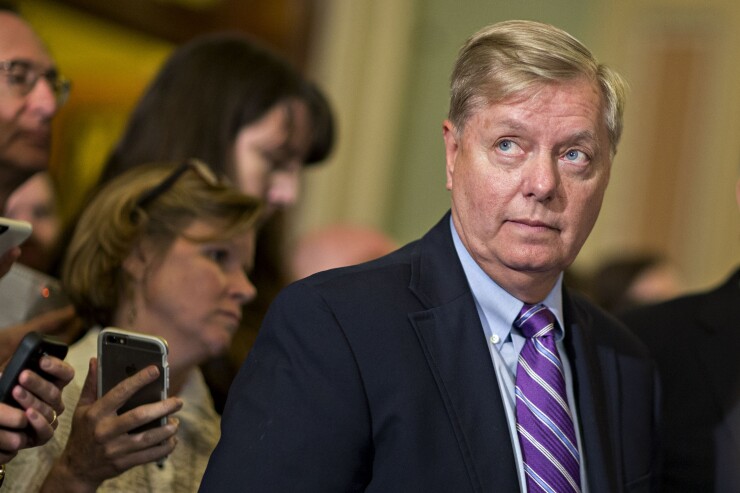(Bloomberg) — At least 21 million fewer Americans would have healthcare coverage from 2020 to 2026 under the Senate Republicans’ latest plan to repeal and replace parts of Obamacare, according to an estimate by the Brookings Institution, a nonprofit think tank.
The number “likely underestimates the reductions in insurance coverage” because it doesn’t take into account difficulties states may face setting up their own health systems, said the policy group, which has been supportive of the Affordable Care Act.

The Brookings estimate is the first look at what the bill, backed by Republican senators Lindsey Graham of South Carolina and Bill Cassidy of Louisiana, would mean for millions of people covered under Obamacare by Medicaid or private plans. The estimate could be a blow to Republicans last-ditch attempts to round up enough votes to get the bill on the Senate floor next week.
The Congressional Budget Office, Congress’s official policy analyst, has said it won’t have its own estimate for some time. A CBO estimate of a previous “skinny repeal” proposal projected that 15 million more people would be uninsured under that bill than under current law by 2026. That legislation, called the Healthcare Freedom Act, failed to pass the Senate.
Funding cuts
Other independent reports have found that the Graham-Cassidy legislation would cut tens of billions of dollars from states that expanded Medicaid to low-income people under Obamacare, and would also result in broad spending reductions compared to current law.
Republicans have pushed ahead in an effort to gather the necessary 50 votes in the Senate, viewing it as an opportunity to make good on campaign promises to repeal Obamacare.
"They’ve been told this is the train to get on,” Tyler Cowen, an economics professor at George Mason University and a Bloomberg View columnist, said in an interview before Brookings released its report. “I suspect they’ll jump off if the coverage numbers are sufficiently bad.”
The Graham-Cassidy bill would take money used to fund coverage under Obamacare and turn it over to states, who would decide how to cover their citizens. Not all states would benefit: Those that expanded Medicaid under the ACA would lose federal funding while states that didn’t expand stand to receive extra billions. The bill also eliminates a requirement that everyone in the U.S. have health-care coverage, loosens insurance protections on pre-existing conditions, and moves Medicaid funding to a fixed, per-enrollee amount instead of paying for a set percentage of states’ costs.
Broad opposition
The bill has generated broad opposition among doctors, hospitals and health insurers, as well as state Medicaid plans. On Thursday, the National Association of Medicaid Directors, a group representing the state plans, said it was concerned the Graham-Cassidy bill would undermine “efforts in many states and fail to deliver on our collective goal of an improved health-care system.”
John Baackes, chief executive officer of L.A. Care Health Plan, which offers coverage options through Medicaid and via California’s Obamacare exchange, anticipates the repeal of the individual mandate and a reduction in funds will throw the state’s health programs “into a tailspin.”
“The unintended consequences are going to be horrendous,” Baackes said in an interview. “It’s as if the thinking is, ‘We’re going to cut the federal share and throw all the money to the states to figure out.’ You’re not giving them flexibility to print money.”
California would lose $61.7 billion in federal funding from 2020 to 2026 if the Graham-Cassidy legislation passes, according to the Kaiser Family Foundation. He predicted that under the Graham-Cassidy bill, young, healthy people who purchased insurance to comply with the coverage rule would likely drop their plans, leaving insurers with older, sicker people. That would likely destabilize the insurance markets.
L.A. Care is a member of the Washington lobby group America’s Health Insurance Plans, which along with the Blue Cross Blue Shield Association, another insurer trade group, came out Wednesday in opposition to the Senate bill.
The bill “would have real consequences on consumers and patients by further destabilizing the individual market; cutting Medicaid; pulling back on protections for pre-existing conditions,” AHIP said in a letter to Senate leaders. The group said the GOP plan would backfire, “potentially allowing government-controlled, single-payer health care to grow.”





